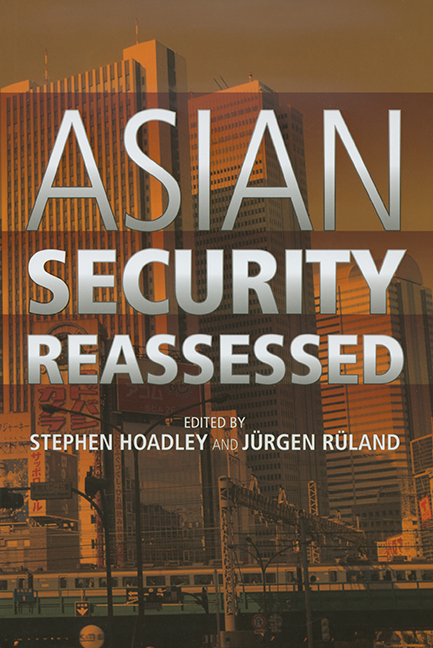Book contents
- Frontmatter
- Contents
- Acknowledgements
- About the Contributors
- List of Abbreviations
- Preface
- Part One Approaches to Asian Security
- Part Two Security Management by Asian States and Regional Institutions
- 2 Asia from Colonialism to Culturalism
- 3 Japan and East Asian Regional Security
- 4 China's Security Strategy and Policies
- 5 United States Security Policies in Asia
- 6 Regional Security Institutions: ASEAN, ARF, SCO and KEDO
- Part Three Non-Traditional Challenges to Asian Security
- Part Four New Concepts of Asian Security
- Index
6 - Regional Security Institutions: ASEAN, ARF, SCO and KEDO
from Part Two - Security Management by Asian States and Regional Institutions
Published online by Cambridge University Press: 21 October 2015
- Frontmatter
- Contents
- Acknowledgements
- About the Contributors
- List of Abbreviations
- Preface
- Part One Approaches to Asian Security
- Part Two Security Management by Asian States and Regional Institutions
- 2 Asia from Colonialism to Culturalism
- 3 Japan and East Asian Regional Security
- 4 China's Security Strategy and Policies
- 5 United States Security Policies in Asia
- 6 Regional Security Institutions: ASEAN, ARF, SCO and KEDO
- Part Three Non-Traditional Challenges to Asian Security
- Part Four New Concepts of Asian Security
- Index
Summary
INTRODUCTION
This chapter discusses East Asia's cooperative security arrangements and regional organizations insofar as they seek to make a contribution to regional security. The chapter will focus on the Association of Southeast Asian Nations (ASEAN), the ASEAN Regional Forum (ARF), the Shanghai Cooperation Organization (SCO) and the Korean Energy Development Organization (KEDO). In doing so, it will outline the respective security agendas of these four institutions and provide an overview of their responses in the face of the security challenges of the post-Cold War period. Particular attention will be given to developments since the Asian financial crisis of 1997–98 and the terrorist attacks of 11 September 2001. Although the above regional security institutions will be discussed individually for the most part, it is also one of the aims of this chapter to provide a brief comparison between them in the concluding section.
Two points must be stressed from the outset. First, East Asia's security institutions neither have the same membership, nor do they all aspire to enhance regional and international security in the same way. Given the inter-governmental nature of cooperation, they moreover tend to be hostage to the national foreign policies of their respective members. This implies that their purpose and the decisions and actions taken by them reflect the consensus of their members. This consensus takes concrete form in the normative framework underpinning security cooperation, the agenda, and the resources and capabilities with which their members have invested them.
Second, when analysing cooperative security arrangements and regional organizations it is also necessary to bear in mind that relations between members and the major powers shape their development and achievements. For example, although states seeking security may be party to a security regime, they may also want to rely in some way on a major power for their defence, irrespective of whether the major power concerned is itself party to the security arrangement in question. This sort of reliance is particularly likely when the major power in question is in effect a hegemonic power that is capable of offering extensive security cooperation to another state or is otherwise enhancing its defence capacity and the security of the incumbent regime. In such a case, the significance of cooperative security arrangements may be severely reduced.
- Type
- Chapter
- Information
- Asian Security Reassessed , pp. 128 - 168Publisher: ISEAS–Yusof Ishak InstitutePrint publication year: 2006



